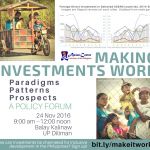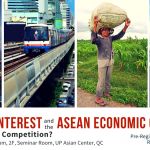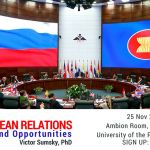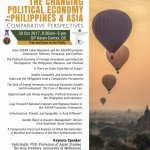-
About
The Bugkos Research Program of the Asian Center undertakes comparative and regional studies under the theme, “Putting Equitable Development at the Center of the Asian Century.” The two-year research program, which began in December 2015 and is funded by the Emerging Interdisciplinary Research Program (EIDR) under the UP Office of the Vice President for Academic Affairs.
-
Rationale
Since the 2000s, Asia has been at the center of world politics and the global economy. Much of the interest comes from the dramatic changes unfolding in the region. Asia is home to some of the world’s biggest and fastest growing economies. The ascent of China as the world’s second largest economy, with India close behind, and the rapid growth of Southeast Asia’s market economies point to the 21st century as Asia’s for the taking.
Asia, however, is undergoing a long transition and where it is headed is still open to question. The Asian Development Bank (2011) has cautioned that for the region to complete its historic transformation, it needs to address age-old problems: growing inequality within and across countries, relatively low technology and productivity leading to the so-called “middle income trap,” unsustainable energy consumption and environmental degradation, and poor governance.
With the aim of interrogating Asia’s rise, the Asian Center has launched “Bugkos: Putting Equitable Development at the Center of the Asian Century,” its institutional research program done in collaboration with other academic institutes and think tanks in the University of the Philippines and beyond. Bugkos promotes comparative and regional studies, using political economic and socio-cultural analytical lenses. Toward advancing an interdisciplinary approach, the Program’s current researches bring together scholars in the fields of economics, political science, anthropology, international studies and Asian Studies.
-
Research Thrust
Studies under Bugkos investigate different dimensions of the research question: under what conditions would Asia’s transition lead to equitable development?” Since the studies will mostly focus on Southeast Asia, the Program adopts the definition of equitable development, put forward by the Association of Southeast Asian Nations or ASEAN (2011), as “narrowing development gaps within and between…states, better access to opportunities for human development, social welfare and justice, and more inclusive participation in the process of…integration and community building.” Bugkos also includes in its framework the reduction of poverty and social inequality. Toward gaining a deeper understanding of the present conjuncture, the project’s research objectives are as follows:
-
-
- To examine and update analytical frameworks that have been identified with Southeast Asian/Asian development.
- To determine new institutional arrangements structuring the interaction among regional, national and community actors in relation to specific policy domains.
- To surface new development challenges that arise from the increased encounters between North and South, center and the periphery, and tradition and modernity
- To explore how the Philippines can benefit from opportunities and minimize risks arising from the changes in the region.
The term “Bugkos” is the Tagalog, Kapampangan, Cebuano, and Hiligaynon word for “bundle.” This reflects the coming together of communities, countries, and academicians across the region towards achieving synergy and strength—rather than discord.
-
Individual Studies
The Political Economy of Foreign Investment and Industrial Development: The Philippines, Malaysia, and Thailand in Comparative Perspective
Dr. Manuel Montes, South Centre, Geneva; and Jerik Cruz, Ateneo de Manila University
The Role of Energy Reserves in National Economic Growth and Development: The Case of Myanmar and Iran
Dr. Henelito Sevilla, Jr., UP Asian Center
Infrastructure, Growth, and Inequality: Is Asia Different?
Dr. Margarita Debuque-Gonzales, UP School of Economics
Rapid Growth and Rising Inequality: Political Economy of the Philippines and Indonesia
Dr. Antoinette Raquiza, UP Asian Center
Intra-ASEAN Labor Migration and the ASEAN Economic Community: Patterns, Prospects, and Conflicts
Dr. Geoffrey Ducanes, Research Fellow, UP Center for Integrative and Development Studies
Health, Inequality, and Inclusive Development: Philippines and India from a Comparative Perspective
Dr. Maria Dulce Natividad, UP Asian Center
The Philippines' Economic Vulnerability to Chinese Sanctions
Dr. Tina Clemente, UP Asian Center (co-authored with Dr. Nona Pepito, ESSEC Business School)
** These studies were presented in a colloquium on 20 October 2017
-
Public Fora
Apart from conducting research, Bugkos also organizes related forums to contribute in extending the discussion and examination of Asia as a region to the public.



-
Meet The Team ◊ Contact
Program Team Members
- Program Leader: Dr. Antoinette Raquiza
- Project Leader: Dr. Dulce Natividad
- Program Operations Manager: Sascha Gallardo
Research Assistants
- Nikka Garriga (until October 2017)
- JM Lanuza (until June 2017)
- Josephine Bautista (Until November 2017)
- Mariz Reyes (Bookkeeper; until September 2017)
Contact
This email address is being protected from spambots. You need JavaScript enabled to view it.; This email address is being protected from spambots. You need JavaScript enabled to view it.
-
About
The Bugkos Research Program of the Asian Center undertakes comparative and regional studies under the theme, “Putting Equitable Development at the Center of the Asian Century.” The two-year research program, which began in December 2015 and is funded by the Emerging Interdisciplinary Research Program (EIDR) under the UP Office of the Vice President for Academic Affairs.
-
Rationale
Since the 2000s, Asia has been at the center of world politics and the global economy. Much of the interest comes from the dramatic changes unfolding in the region. Asia is home to some of the world’s biggest and fastest growing economies. The ascent of China as the world’s second largest economy, with India close behind, and the rapid growth of Southeast Asia’s market economies point to the 21st century as Asia’s for the taking.
Asia, however, is undergoing a long transition and where it is headed is still open to question. The Asian Development Bank (2011) has cautioned that for the region to complete its historic transformation, it needs to address age-old problems: growing inequality within and across countries, relatively low technology and productivity leading to the so-called “middle income trap,” unsustainable energy consumption and environmental degradation, and poor governance.
With the aim of interrogating Asia’s rise, the Asian Center has launched “Bugkos: Putting Equitable Development at the Center of the Asian Century,” its institutional research program done in collaboration with other academic institutes and think tanks in the University of the Philippines and beyond. Bugkos promotes comparative and regional studies, using political economic and socio-cultural analytical lenses. Toward advancing an interdisciplinary approach, the Program’s current researches bring together scholars in the fields of economics, political science, anthropology, international studies and Asian Studies.
-
Research Thrust
Studies under Bugkos investigate different dimensions of the research question: under what conditions would Asia’s transition lead to equitable development?” Since the studies will mostly focus on Southeast Asia, the Program adopts the definition of equitable development, put forward by the Association of Southeast Asian Nations or ASEAN (2011), as “narrowing development gaps within and between…states, better access to opportunities for human development, social welfare and justice, and more inclusive participation in the process of…integration and community building.” Bugkos also includes in its framework the reduction of poverty and social inequality. Toward gaining a deeper understanding of the present conjuncture, the project’s research objectives are as follows:
-
-
- To examine and update analytical frameworks that have been identified with Southeast Asian/Asian development.
- To determine new institutional arrangements structuring the interaction among regional, national and community actors in relation to specific policy domains.
- To surface new development challenges that arise from the increased encounters between North and South, center and the periphery, and tradition and modernity
- To explore how the Philippines can benefit from opportunities and minimize risks arising from the changes in the region.
-
The term “Bugkos” is the Tagalog, Kapampangan, Cebuano, and Hiligaynon word for “bundle.” This reflects the coming together of communities, countries, and academicians across the region towards achieving synergy and strength—rather than discord.
-
-
Individual Studies
The Political Economy of Foreign Investment and Industrial Development: The Philippines, Malaysia, and Thailand in Comparative Perspective
Dr. Manuel Montes, South Centre, Geneva; and Jerik Cruz, Ateneo de Manila University
The Role of Energy Reserves in National Economic Growth and Development: The Case of Myanmar and Iran
Dr. Henelito Sevilla, Jr., UP Asian Center
Infrastructure, Growth, and Inequality: Is Asia Different?
Dr. Margarita Debuque-Gonzales, UP School of Economics
Rapid Growth and Rising Inequality: Political Economy of the Philippines and Indonesia
Dr. Antoinette Raquiza, UP Asian Center
Intra-ASEAN Labor Migration and the ASEAN Economic Community: Patterns, Prospects, and Conflicts
Dr. Geoffrey Ducanes, Research Fellow, UP Center for Integrative and Development Studies
Health, Inequality, and Inclusive Development: Philippines and India from a Comparative Perspective
Dr. Maria Dulce Natividad, UP Asian Center
The Philippines' Economic Vulnerability to Chinese Sanctions
Dr. Tina Clemente, UP Asian Center (co-authored with Dr. Nona Pepito, ESSEC Business School)
** These studies were presented in a colloquium on 20 October 2017
-
Public Fora
Apart from conducting research, Bugkos also organizes related forums to contribute in extending the discussion and examination of Asia as a region to the public.



-
Meet The Team ◊ Contact
Program Team Members
- Program Leader: Dr. Antoinette Raquiza
- Project Leader: Dr. Dulce Natividad
- Program Operations Manager: Sascha Gallardo
Research Assistants
- Nikka Garriga (until October 2017)
- JM Lanuza (until June 2017)
- Josephine Bautista (Until November 2017)
- Mariz Reyes (Bookkeeper; until September 2017)
Contact
This email address is being protected from spambots. You need JavaScript enabled to view it.; This email address is being protected from spambots. You need JavaScript enabled to view it.












